#can I meta on my own post?
Text
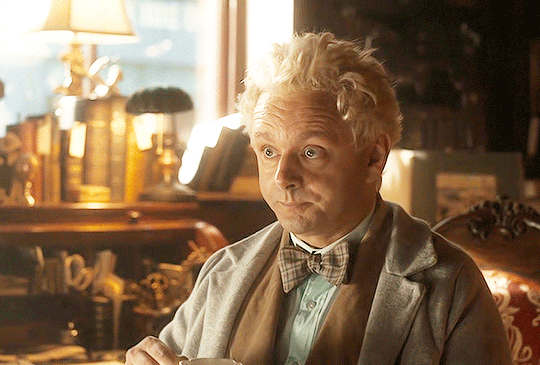
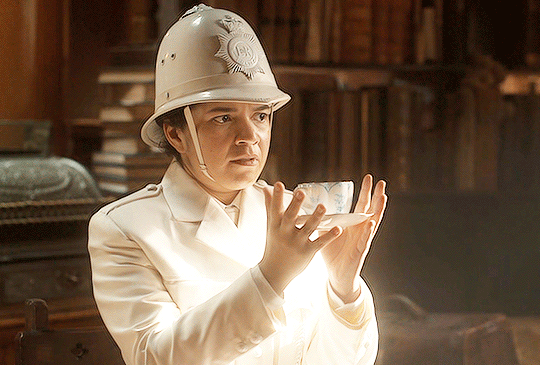
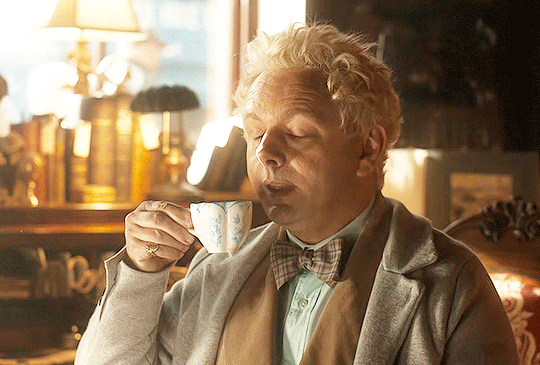
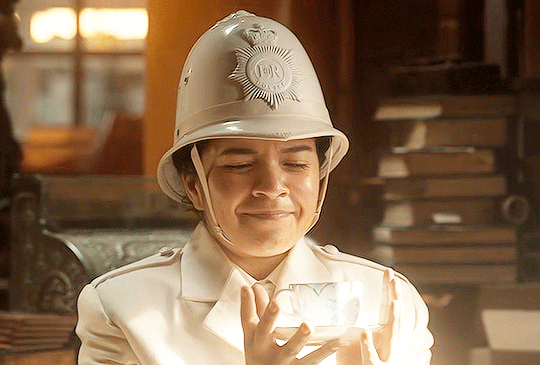
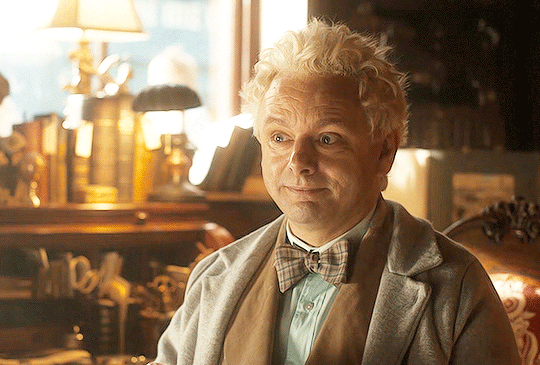
#good omens#aziraphale#muriel#goodomensedit#tvgifs#tvedit#my gifs#gifs#can I meta on my own post?#obviously I love how precious they are both being#muriel is the sweetest thing#and aziraphale respects her boundary about the tea which kudos for that#but his face isn't just sympathy#it's empathy#he must remember what he was like before crowley temped him#he also bought into heaven's propaganda that human stuff is wrong or gross or not fit for angelic consumption#but crowley showed him it is good and wonderful in its own way#and I think he is reliving everything muriel is missing out on in that moment
575 notes
·
View notes
Text
I feel like not enough people talk about how desensitized Mob is to horror. As in, there's literally an omake where he watches all through a horror movie with a straight face, only flinching because of the sounds, and also, his percentage never ticks up just because of a spirit, even if it's an objectively terrifying one. I mean, it's obviously because he grew up alongside spirits and so they are a perfectly normal part of his life, but like.. that's so fun i think?? And it has a lot of comedic potential methinks.
Like, imagine his school friends inviting him along to a horror movie night, expecting the seemingly timid and naive boy to get scared shitless, but instead they're the ones who end up clinging to each other, hiding behind their hands and crying, all the while mob is nonchalantly watching, and lowkey falling asleep even - and they're all just "???? How??? Are you so fucking calm??!?" And Mob just shrugs and points to a being missing a jaw in the corner of the screen and says "i like that one. It looks cute". They all stare at him like he's insane;
Or him helping Ritsu when he realizes the younger has been struggling with getting used to spirits now that he's an esper - seeing shadows in the corners of his vision, knowing there's things watching him as he goes about his day, decapitated bodies and strange creatures roaming the streets - and tries to help him see that they're not always harmful, and teach how to get them to go away if need be, and reassures him that they can't get in their house due to Mob's aura, so he's still safe there - which is to say, at least, now Ritsu knows for sure that there are no spirits in his room, still traumatized from a comment or two Mob made when they were kids and never bothered to elaborate on, lmao. Mob apologizes for not clarifying that they were long gone, it just never occured to him that that would probably be scary to any other normal kid;
Or imagine him entering the s&s office one day, and Reigen greets him as usual, until he looks up from his computer and there is a fucking eldritch abomination of some sort of misshapen child hanging off of Mob's shoulders, and, as one might expect, he Freaks, and Mob is just like "Shishou, stop screaming. This is Lily. I promised to help her with her homework so she can pass on on her own". Etc...
Like, it's just really funny to me. Let Mob be a bit strange and off putting, he deserves it <3
#mp100#mob psycho 100#kageyama shigeo#i feel like people sometimes forget that mob can see spirits tbh jdshs#like thats just a normal part of his life. he would not be scared of them.#(no offense to the people making the funnies about mob 'hallucinating' ghosts and getting terrified of course jdhdhdh. i find it funny too#i just dont think its entirely accurate)#kageyama ritsu#reigen arataka#headcanon#meta#my own post#i just really like thinking about spirits in the mp100 universe and mobs relation to them tbh......
1K notes
·
View notes
Text
I’ve mentioned this elsewhere but it feels relevant again in light of the most recent episode. Something that’s really fascinating to me about Orym’s grief in comparison to the rest of the hells’ grief is that his is the youngest/most fresh and because of that tends to be the most volatile when it is triggered (aside from FCG, who was two and obviously The Most volatile when triggered.)
As in: prior to the attack on Zephrah, Orym was leading a normal, happy, casual life! with family who loved him and still do! Grief was something that was inflicted upon him via Ludinus’ machinations, whereas with characters like Imogen or Ashton, grief has been the background tapestry of their entire lives. And I think that shows in how the rest of them are largely able to, if not see past completely (Imogen/Laudna/Chetney) then at least temper/direct their vitriol or grief (Ashton/Fearne/Chetney again) to where it is most effective. (There is a glaring reason, for example, that Imogen scolded Orym for the way he reacted to Liliana and not Ashton. Because Ashton’s anger was directed in a way that was ultimately protective of Imogen—most effective—and Orym’s was founded solely in his personal grief.)
He wants Imogen to have her mom and he wants Lilliana to be salvageable for Imogen because he loves Imogen. But his love for the people in his present actively and consistently tend to conflict with the love he has for the people in his past. They are in a constant battle and Orym—he cannot fathom losing either of them.
(Or, to that point, recognize that allowing empathy to take root in him for the enemy isn't losing one of them.)
It is deeply poignant, then, that Orym’s grief is symbolized by both a sword and shield. It is something he wields as a blade when he feels his philosophy being threatened by certain conversational threads (as he believes it is one of the only things he has left of Will and Derrig, and is therefore desperately clinging onto with both bloody hands even if it makes him, occasionally, a hypocrite), but also something he can use in defense of the people he presently loves—if that provocative, blade-grief side of him does not push them—or himself—away first.
(it won’t—he is as loved by the hells as he loves them. he just needs to—as laudna so beautifully said—say and hear it more often.)
#critical role#cr spoilers#bells hells#orym of the air ashari#cr meta#imogen temult#ashton greymoore#liliana temult#this is genuinely completely written in good faith as someone who loves orym#but is also about orym and so will inevitably end up being completely misconstrued and made into discourse. alas#I could talk about how Orym’s unwillingness to allow the hells to actually finish/come to a solid conclusion on Philosophy Talk#is directly connected to one of the largest criticisms of c3 (that they are constantly having these conversations)#all day. alas. engaging with orym’s flaws tends to make people upset#it is ESP prevelant when he walks off after exclaiming ‘they (vangaurd) are NOT right’#which was not only never said but wasn’t even what they were talking about#he even admits as much to imogen like ten minutes later! that he is incapable of viewing it objectively#which is 100% justifiable and understandable but simultaneously does not make his grief alone the most important perspective in the world#also bc i fear ppl will play semantics on my tags yes the line ‘i hope she’s right’ was said but it was from ASHTON#who does not believe they are at all and wasn’t saying they actively WERE right. orym just heard something to latch onto and ran with it#ultimately there is a reason orym only admitted that he was struggling when he had stepped away to talk to dorian#who has not been around and thusly has not changed once n orym's eyes#and it isn't that the hells never check in or care. they do. they have several times over#it is dishonest to say they haven't#the actual reason is that all of this is something He Is Aware Of. he doesn't mention it bc he KNOWS it's hypocritical and selfish#he says as much!#EXHALES. @ MY OWN BRAIN CAN WE THINK ABT MOG AGAIN. FYRA RAI EVEN. FOR ME.#posting this literally at 8 in the morning so I can get my thoughts out of my brain but also attempt to immediately make this post invisibl
157 notes
·
View notes
Text
Will Zoro leave Luffy after they achieve their dreams? Not likely
Saying Zoro's gonna voluntarily leave Luffy at the end of OP so he can "live his own life" (i.e. get married, open a dojo, hang out in bars) is so wild to me. That's like saying Luffy's gonna give up adventuring so he can sit around and gorge himself on meat
First of all, it ignores that Zoro genuinely enjoys traveling with Luffy. Luffy (who's always getting into trouble) gives Zoro the chance to be his best self. And Zoro (who very much wants to be his best self) will always seize that chance with both hands
Second, both characters are like...the poster children of wanting to have their cake and eat it too. If you're Luffy or Zoro, you rarely need to make either/or choices. That's what makes them unique. It's why they've both got conqueror's haki! Basically: If Zoro wants to drink until he blacks out? If he wants to nap all day? Hell, if he wants to get lost in a paper bag?? He is like a big cat. He will do what he wants, wherever he is. He doesn't need to leave Luffy to get those things LOL
Third, Luffy's made it clear the Pirate King needs no less than the Greatest Swordsman by his side. Why would that suddenly stop once they've both achieved their dreams? Is Luffy going to quit being Pirate King? Why would he? Luffy wants to be the most free in the world, so he can live the life he wants...with the people he wants to live it with
In other words, Luffy isn't letting Zoro go without a fight — not unless Luffy genuinely feels he's no longer the type of man Zoro would want to travel with. And wouldn't that be the worst ending for both of them?
#monkey d. luffy#roronoa zoro#one piece#text post#my meta#zolu#tho just kind of??#keep seeing this take on different platforms and I simply do not understand where it comes from#Whyyyyy would Zoro or Luffy want anything else#when they WORK SO HARD to keep everything they need right beside them?#imo it's very telling that Luffy's response to someone potentially getting married is:#“Great! They can bring their spouse on board!”#I imagine he'd feel the same about children or anything else his crew may want.#Nobody needs to go their separate ways to “live their lives”; not unless the characters' priorities fundamentally change#which happens of course; because people change and that's okay too#AT THE SAME TIME it's so hard to imagine this for characters like Luffy and Zoro#who unapologetically live life on their own terms#are very open about what they want as soon as we meet them#and have ONLY gotten to where they're at because they refuse to make compromises about those things.
267 notes
·
View notes
Text
friendships as marital ties (and other notes on relational ties) in mlc

this is sort of a third installment in the series of meta on 'mlc as an exemplar of constructing queer narratives out of chinese ideological frameworks' (1. jianghu as queer space and 2. how it manifests in li xiangyi) - focusing on the nature of relationships in it. (which I've briefly mentioned in the first one and finally actually getting to it!!)
-
I would like to first call attention to chinese ideological frameworks as a premise of queer reading in mlc. the goal of chinese philosophy is to explore the becoming of human, taking two broad paths of the (mainstream) secular vs. escaping the secular. (these two paths are not a strict dichotomy, and rather, are ever in flux and in conversation with each other.) as said by @markiafc too, chineseness is so much about the rigidity of structures, and in equal part, a desire to break out of them. thus, chinese ideological frameworks can very much offer a rich reading of queerness - that mlc, a story very deliberately structured based on chinese ideologies (more accurately, with good reasons for me to believe that it is as such), has managed to materialise.
if the conceptualisation of queerness is premised on a defiance against mainstream norms, then a reliable way to read queerness in chinese ideological frameworks can be to deconstruct it by the mainstream confucian frameworks.
in mlc, this is implicitly set up with its stage of wulin/martial jianghu. then it is further broken down by asking, hey wulin jianghu is still closely related to the hegemonic values and the mainstream structure of authority (historically, 侠 xia being politically involved says a lot about this), so what is the true meaning of jianghu? what does it then really take for jianghu to be a queer space offering comfort and freedom to those who have escaped to it - to be the space that allow the transcendence of rigid roles and labels? mlc took a step further to resist the proxy to mainstream values that wulin jianghu has become.
this is why there can be a very strong buddhism reading of mlc (suggested here, expounded in the A+++ meta by @markiafc here and here, and also what I've seen discussed by cnet as well), given that buddhism is one of the 'extra-secular' ideologies, alongside (philosophical) taoism. I've also touched on a taoist angle in this meta. both schools are articulated in different sets of languages, but ultimately convey a same ideal of what it means to be human and how to live well - that is, to resist the roles and labels defined by the norms.
so, back to confucian frameworks.
a lot can be discussed about mlc with it. but in the context of this meta about relationships in mlc, it's specifically drawing on how confucianism conceptualises social relationships with familial ties as a cornerstone, and how these relational ties are inextricable from the conceptualisation of the 'self'.
as such, one of the things about mlc that has fascinated me is how deliberately it seems to ignore and reject the conventional familial ties (the kind by blood and marital ties). I've joked about how it is a miracle for me to love mlc as much as I do, as a prime dysfunctional family story enjoyer, despite none of its main characters struggling with any complicated feelings about their (biological) parents. but on closer examination, mlc is also making a comment on the model of familial-based relationships that dominates mainstream society - but through the absence of it.
with this, I want to talk about 1) how mlc rejects the conventional ties; and then 2) how it repurposes these ties in its own ways.
-
the five relational ties in confucianism:
father and son 父子有亲 - (natural) affection between father and son
ruler and subject 君臣有义 - righteous relationship between ruler and subject
older and younger brothers 兄弟 (长幼有序) - this is actually about seniority within the family; the order between older vs younger family members
husband and wife 夫妇有别 - differentiation between husband and wife (demarcated by the 内外 spectrum of gendered inner-external spheres)
friends 朋友有信 - trust between friends
logically inferred, all these ties are hierarchical and familial-based except for the last one: friends. ruler-subject is sort of an extension of the natural familial ties, while friendship is the inverse space of 1-4 (ie. you fall back on 5 to define a social relationship outside of the familial sphere that cannot be qualified as 1-4). while all are premised on mutuality, it is only no. 5 that is defined by a sense of choice and equality.
on the surface, 1-4 don't quite exist in mlc in particularly meaningful ways to the narrative or are even outright overlooked, and friendship is the relational tie most valued by mlc. we can tell it's true just by looking at the most meaningful relationships in mlc of difanghua. but at the same time, it is more nuanced. we can take a closer look at how the story plays around with most of the ties as part of a broader queer narrative.
-
1) how mlc rejects the conventional ties
mlc's rejection of mainstream relational ties can be best seen in fdb escaping from marriage. and it was not just any engagement with anybody but an engagement with the imperial family. he struggles with the prospect of being married to princess zhaoling, but generally, it's about the idea of complying to mainstream conventions and expectations that includes compulsory heterosexuality. all these point not only to a defiance against amatonormativity - the resistance of the traditional husband-wife tie, but also an irreverence for the ties of ruler-subject (the engagement being an imperial decree) and father-son (matters of marriage being sole decisions made by parents).
of course this is on top of how fdb's own biological father is a p-o-s, and the narrative gives fdb minimal struggles in this aspect, allowing him to sever this tie without looking back (I love it, yeap). along the same line is how lxy is an orphan, who came to gain important relationships that are built on natural compassion among people rather than innate, blood-based ties - even as llh. the sense of defiance from the narrative is especially stark to me considering that he could have a completely different familial-based life - as a son, brother, and ruler, if his biological family was still around. the narrative also deliberately treats his biological brother as a phantom, replaced with an older brother who he was bonded with neither by blood nor marital ties. on dfs's front, absolutely nothing is to be known about his biological family. his childhood history with the toxic patriarch of his life - who is not even his biological father - was afforded a clean break and closure.
we can keep going on, but that's pretty much the point.
ritualisation is one of the most important things of the confucianism school, especially to the honoring of these social relationships (and the officiating of social roles). the one ceremony/ritual we saw in mlc involving the main characters - or more accurately speaking, came closest to seeing - was the imminent wedding ceremony of dfs and jlq. even in that case, it was premised on non-mutuality with dfs being the unwilling, passive party. (fem-coded dfs? 25 marks.)
and that brings us to the next part.
-
2) how mlc repurposes these ties
that particular wedding ceremony gets hijacked by dfs and lxy/llh, and gets turned into an important milestone in their relationship. they consummate - what is on text - their friendship after a long time being more enemies and rivals than friends. it is a clear establishment of the trust they have for each other. and here it is where I circle back to the subject of this post: friendships as marital ties.
in this article, as a part of a feminist, egalitarian reframing of confucianism, there is a proposal for spousal relationships to be reframed as a friendship tie. (this aligns with the interrelatedness of the five ties eg. the ruler-subject mirrors father-son dynamic, with the confucian belief that rulers have an obligation to their subjects alike parents to their own children.) by doing so, it removes the functional, gendered differentiation assigned to marital ties, and shifts it to something equal, and independent of gender. you exalt the value of trust between spouses, instead of basing marital relationships on gendered roles. as such, spouses become more like friends, and conversely, friends can also become more like spouses. (romance not a prerequisite. it has never been about romance anyway.)
given that mlc has repeatedly applied marital motifs to llh and dfs's characters in their joint narratives, this opens up a reading friendships as a marital tie. seeing marriage as a bridge for strangers to become family, marriage in mlc becomes a metaphor for the chosen commitment and mutual trust put in by strangers/friends (non-familial ties) into the becoming of family. the blurring of lines between marital ties and friendship encourages a genuine space of queer experience that goes beyond any pressure for strict labels - of sexuality, and relationships as romantic, sexual, etc etc.
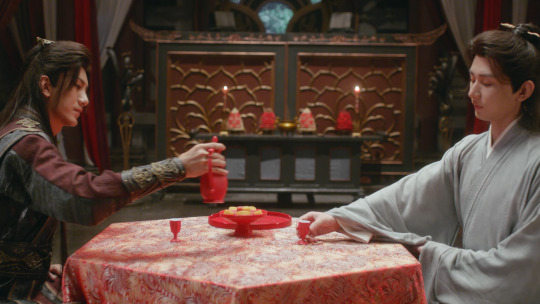
(note: despite the borrowing of a feminist concept, I strongly hesitate to call mlc a feminist story. it's a whole discussion - or debate - on its own. nevertheless, it is definitely a gender-conscious story that lays foundation for a strong queer and egalitarian reading.)
-
it is to be noted that it is intended - and also beneficial to take the confucian framework of relational ties beyond face value. the framework offers what it believed to be the most fundamental social relationship dynamics, and sees room for extension and matching to other kinds of relationships (all if not, most). a relationship such as teacher-student, which is outside of the five ties stated, can also mirror the affection of father-son ties, albeit not in a literal and identical way.
speaking of which. fdb and lxy/llh.
indeed they're known by others to be good friends. fdb thinks they're good friends too - insists on it, and puts his best efforts in keeping it that way. but does it really go both ways? if it does not, then can it really still be friendship? my humble take is that, ultimately - weighing in with llh's perspective - this is a relationship that is not so much based on trust, and rather, based on an innate affection that is only unique to family. (in this case, not blood/marital-based but one that was chosen and built aka lxy's relationship with sgd.) in other words, less of a friendship, more of a familial one.
it is a lot clearer considering their relationship from llh's point of view: some brat you never wanted in your life came barging in, and whether he was going to bring any positive effect to your life was secondary to the tranquility - which you have carved for yourself in the past decade - that is so integral to your personhood. no way. but the moment you hear that he's family? well, that changes the game completely. even before learning about fdb being sgd's son (then beginning to take initiative in showing greater acceptance), it is apparent in llh that there was an instinctive resonance with fdb as his shixiong's nephew. (eg. he remarked to his shifu's grave about how alike fdb is to himself.) this is unlike with dfs whom he had taken a much longer time to build trust with. you do not apply trust - aka the quality of friendships - to family. family is something deeper, more instinctive than that. if fdb was never family, I find it hard to imagine given llh's personality, that he would have let some brazen, bratty stranger intrude for that long. (boy invited himself to llh's home, sat himself down eating the owner's dinner and nosing in his cooking abilities!!! ily bb but that was uncalled for 😭)
of course there are many more layers in their relationship. there is a substantial degree of their history as (unwitting) teacher-disciple: fdb is still healthy and alive all thanks to the existence of lxy as a spiritual teacher role model in his life, regardless it being one-sided or not. there is also indeed some part of friendship in it, especially from fdb's point of view. he sees llh as a kindred spirit who he could enjoy a life of freedom with for life. but llh never reciprocates. he knew this was short-lived. and so ultimately, the hierarchical layer of their relationship overpowers the equal one, where llh's treatment of fdb as a nephew/小辈 younger family member and a disciple is the one that sealed the fate of their relationship.
if (blood-based) familial ties are irrelevant in jianghu, then the closest proxy to a father-son relationship in the martial world would be a teacher-disciple relationship. lxy and his shifu are a clear, indisputable example. for fdb and llh, their teacher-disciple tie is murkier and not consistently applied. they were also never ritualised as teacher-disciple, and thus are not teacher-disciple in any official capacity as far as confucian ideas are concerned. yet in crucial moments, it is invoked by llh as a card of authority over fdb to get out of sticky situations with fdb. and there was their final scene together: in a moment of sincerity, llh gives the approval to fdb as his disciple - then entrusting fdb with the secret manual of his techniques, up until his final letter in which fdb was recommended to dfs as a successor to his martial abilities.
in an imperial setting, this would have been the relationship of an emperor and his crown prince that straddles both ruler-subject and father-son ties aka a tag-team of disaster. the teacher has an obligation to nurture his disciple as a successor to himself, and love him like a son too. on the flipside, he holds the final power in their relationship - withholding knowledge and feelings from the younger one. they are only equals in a way a parent-child can be. they are only equals as much as the parent allows. and this is how fdb got left behind in the dust of llh's departure. he was the child treating his parent like a friend, supporting him emotionally and begging to be loved back the same way he loves his parent - but the parent had a lifetime way ahead of him and stayed out of his reach, physically and emotionally.
llh and fdb operate with the trapping of a friendship but have always been family in the core. llh had known that way before fdb did, just like everything else he had known and put out of fdb's reach. because. fdb did not have to know. fdb is different and will forge his own path. and that's a kind of love llh has for him that nobody understands (in fact not even fdb himself) - one that is on a different plane from friendships.

by repurposing the framework of relational ties, mlc showed that the essence of familial relationships aka its intimacy and closeness can be independent from biology and formalised rituals. and it is important to myself for stories to say that people can build close ties and deeply meaningful relationships even without being born or ritualised into any.
-
then back to how these relational ties are inextricable from the conceptualisation of the 'self' in confucian worldview: the roles you play in these relationships are intended to define you. there is no 'self' independent from it. while the concept of a social, relational self is fully rooted in reality, being locked into social roles can be a painful way to live - a way that llh has experienced as lxy the sigu sect leader. so, in order for lxy/llh to realise a sense of self that exists outside the norms, it inevitably points to another way that requires a cut from these relationships. that is then the buddhist (or taoist) answer of looking past attachments to the world such as the confucian idea of relationships defining your being. only with a dissolution of a sense of 'self', can there be true liberation.
#莲花楼#mysterious lotus casebook#lhlmeta#lhl#my posts#dihua#can't believe this is how i choose to spend an inordinate amt of my free time 😐😐 being a broken recorder of brainrot 😐#anw the handful of fanghua moments that have moved me are the ones that are about the unbridgeable gap between them as 长辈小辈 as 徒弟师父#(me realising lxy telling fdb 这个徒弟我没有白收 actually drives me nuts)#me: a brainrot-level dihua shipper first and foremost. also me: dedicating more of this meta to fanghua than dihua#about how fanghua's relationship is its own unique kind in the story. equally deep as dihua. just in a wholly different way.#dihua are friends and married and familial. but fanghua is family through and through#-> tl;dr of this meta actually#i just have extremely strong feelings about fanghua as a complicated little family unit.#which is independent of “shipping” FOR ME. but for anyone else though you can make anything out of it.#(gotta admit i'm a bit antsy about posting this and is uncertain how it's gonna be read. bc my reading of fanghua is so specific...well)#anyways. obsessed with dihua appropriating the heteronormative rituals <3#edit: I CAN'T BELIEVE I FORGOT TO TALK ABOUT DIFANG aaaAAAGHHHHHHHHHH#but. it's true they're very purely friendship-based i think
95 notes
·
View notes
Text
uhh so..i started reading the book hsy talks about (barthes' mourning diary) and i'm going insane. it's a collection of notes the author started to write the day after his mother died. in short, it's a book about processing grief through writing. and... is this not what hsy have been doing during the years kdj has been in coma
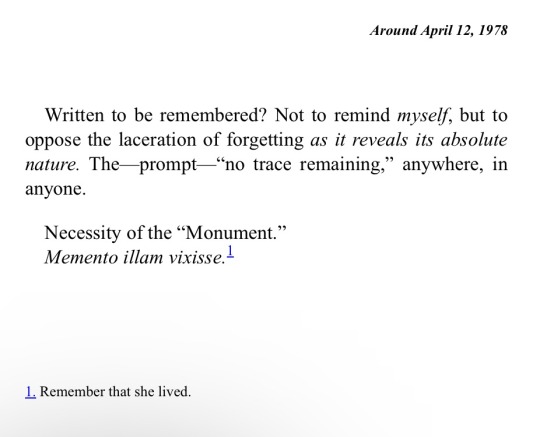


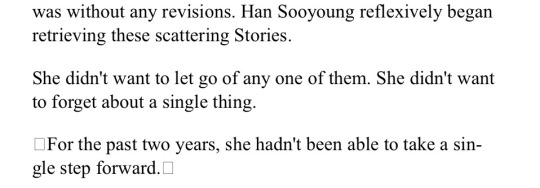
i'm not even halfway through the book so i'm sure i'm gonna find even more parallels but- ugh. orv man. unbelievable. how can every single tiny thing in orv be crafted with so much care and love. how am i supposed to get over it
#cursing at the skies DAMN YOU ORV.....DAMN YOUUUU...BEAUTIFUL STORY.....#hsy is INSANE to reccomend thiss to her students so they can analys webnovels#dealing w my own grief about my mom this bookjust punched in the guts multiple times#ok usual tagging cause if i suffer everyone has to suffer too#orv posting#orv spoilers#orv analysis#hankim#orv meta#orv hsy#doksoo
73 notes
·
View notes
Text
what i love about the Famous Actor Natori Shuuichi of it all is that...it's not just that he's famous and therefore widely recognizable wherever he goes. like yes that is very funny because he was an exorcist before he became a famous actor, which means he CHOSE, on purpose, a day job that would make it harder to hide his double life/secret identity from the hordes of his adoring public, but it's more than that. it's not just that he's famous, it's that he's famous specifically for being an ACTOR, aka a person whose job it is to dissimulate, to make believe, to inhabit roles and emotions other than his own. like he decided he was going to become as visible as possible (which again was literally not necessary! he could have gone into any other career for his day job!!) but in such a way that everyone would see him but no one would see him - they would just see his various made-up personas, including the Famous Actor Natori Shuuichi persona. i can't decide if he's a genius or if he just made so many absurd decisions that they canceled each other out and circled back around to working out. he's either playing 9-dimensional chess or he's eating the pieces. too soon to say.
#the other thing i love about it is that in a very real sense it's his actor day job that is his alter ego#being an exorcist is his normie job. he's just a famous celebrity on the side#which isn't that uncommon in secret identity setups but it's still very funny#natsume's book of friends#natsume yuujinchou#natori shuuichi#natsuyuu meta#my posts#f#i think probably the actual answer is that acting was a very natural career choice because he already masks so extensively#both to hide that he can see things other people can't (and that youkai exist and that he exorcises them)#and to hide what he's really feeling so that no one can use it against him#so if it's already something he has to do & he's good at it...why not have someone tell him exactly how to do it & get paid for it?#and the other part of the answer is that most ppl don't go into acting assuming they'll get famous. the fame was a side effect#so each decision as it was being made probably made perfect sense. but put them all together#and you have this hilarious assortment of elements that seem to directly contradict each other#okay also i would be remiss if i didn't mention the other possible answer which is that the attention came first and was unavoidable#and the acting developed from the need to protect himself from the attention that he was going to be attracting no matter what he did#because he's so beautiful. and (in the exorcist world specifically) because he's the last of the natori#the more i talk about it the more i'm like no becoming a famous actor was the only path that made any sense for him lol#1) he's gonna be watched no matter what bc he's him -> gotta figure out how to hide his secrets -> learn to act as self-defense#or 2) he's got secrets -> he's gotten a lot of practice hiding them -> hey you could make a career out of this!#all roads lead to actor natori shuuichi. and since he's beautiful...all roads lead to FAMOUS actor natori shuuichi#i love it when i ramble so much in the tags that i end up contradicting my own post lol#he's neither thinking ten steps ahead nor is he irrational. he's simply making sensible individual decisions#that follow logically from what is available to him and what his priorities are
134 notes
·
View notes
Text
𝗠𝗮𝗻𝘆 𝗼𝗳 𝗚𝗮𝗹𝗲'𝘀 𝘃𝘂𝗹𝗻𝗲𝗿𝗮𝗯𝗶𝗹𝗶𝘁𝗲𝘀 𝘄𝗲𝗿𝗲 𝗮𝗴𝗴𝗿𝗮𝘃𝗮𝘁𝗲𝗱 𝘁𝗼 𝗯𝘂𝘁 𝗱𝗲𝘃𝗲𝗹𝗼𝗽 𝗶𝗻𝘁𝗼 𝘁𝗿𝗮𝘂𝗺𝗮 𝗿𝗲𝘀𝗽𝗼𝗻𝘀𝗲𝘀, 𝗿𝗲𝘀𝗽𝗼𝗻𝘀𝗲𝘀 𝘁𝗵𝗮𝘁 𝗠𝘆𝘀𝘁𝗿𝗮 𝗮𝗰𝗰𝗲𝗽𝘁𝘀 𝗹𝗶𝘁𝘁𝗹𝗲 𝗰𝘂𝗹𝗽𝗮𝗯𝗶𝗹𝗶𝘁𝘆 𝗳𝗼𝗿. This lengthy headcanon will refer to canon dialogue from mostly Gale, sometimes others. Reader's discretion is very much advised. There will be in depth explorations into grooming, emotional abuse, heavy manipulation, and suicide.
First, let it be said that Gale, a mortal man, will always be the powerless one in his dynamic with Mystra. Of course, nearing forty years of age, he remains entirely responsible for his own actions, his own foul blunders and every hurt he'll cause, but it's important to remember who formed much of who he is: his goddess, his deity, and egregiously, his lover.
Mystra is power. Mystra is possibility. She knows what sway she holds over her Ioyal, vulnerable, and entirely mortal followers. In all ways that matter, they are but lambs she can steer and herd as she sees fit. She knows they can't deny her, and knows they'll never want to. Gale's sheer servitude and complete devotion; to the very quick of his bones, she lapped them up.
Gale: I was just... practising an incantation.
Player Character: No, there's more to it than that. I know devotion when I see it.
Gale: What can I say? She's—she's Mystra. I can't describe it, the need I sometimes feel to see her - to draw the filaments of fantasy into existence... Mystra is all magic. And as far as I'm concerned, she is all creation.
Player Character: I didn't realize the depth of your devotion.
Gale: Magic is... my life. I've been touched with the Weave for as long as I can remember. There's nothing like it.
Gale, orb in his chest, doomed to be eaten by the very thing he loves the most, still speaks so reverently of the goddess, of his lover that has left him to die. He conjures images of her memory—and she is all the while forgetting about his.
Minsc: Gale reminds me of vremyonni of my homeland. The man-mages of Rasheman. While the girl-folk go on to rule as wychlaran, Weave-touched boys were hidden away. Trained to work their craft in silence and secrecy. It is an old custom, not well-observed. In truth, I thought it born of caution after some catastrophe of wizardly men-folk of old. Now, I wonder if it was not done to hide them from Mystra, and the snares she sets for young and prideful boys, hm?
Tales of Mystra's treachery spreads far, leaving those familiar waters surrounding Gale's tower in Waterdeep. They whisper her name, afraid to utter it one time too many, suspecting, perhaps, that she'll show in their mirror like some Faerûnian Bloody Mary.
Talent rouses Mystra. She can see who uses the gift of the Weave and feel them, sampling whatever delight sings their veins as they pull from her domain. Not unlike a spider, she'll follows every tremor that strikes her as just a sliver more profound; and Gale, a prodigy, plucked the Weave's web to so garner her focus. And like some black widow scurrying, she surged down that ripple to prey on a boy. There, Gale, so impressionable, was just a mite older than twelve whole summers. He sat so stunned, beholding Mystra as she lured him into the cradle of her Astral domain. Bathed in her magic, pleasantly coddled within that glittering cosmos, Gale felt blessed in a way he'll struggle always to recount, no word, no language, fit to describe it. He felt chosen. He felt seen. And potently, to a child, he felt loved. Now, imagine a child experiencing something like that. Imagine what they'd think, how brilliant they must be when stood beside the rest. She told him he was gifted, made his heart swell not unlike a child's appetite for praise. She knew what she was doing by offering these morsels, by preying on a child's most delicate mind, and Gale, child prodigy, was already so awash in the idea that his value was in magic. Unfortunately, Gale, susceptible, had no way of squirming out of his goddess' grasp.
Reality: She's laid down the seeds to creep into his heart. When he's just old enough—seventeen's sufficient, she thinks—she stakes her claim and makes him hers.
Gale: My virtuosic talent once caught the eye of the goddess of magic herself, Mystra, who named me her chosen and her lover.
Gale is stunned when she takes him to bed the first time. (Is this really happening?) Mystra claims his mouth in a kiss, taking everything she knows he offers so willingly. Mystra, of course, is not so stunned.
Dream Visitor: An elder brain... one of the cruelest and most powerful creatures in existence, enslaved by mere mortals.
Gale, tasked with Mystra's missive to sacrifice himself: This is it... I must do as Mystra commands.
Gale has worryingly low self-esteem beyond his magic. As already explored, his entire worth as a man hinged on and was built entirely off his talent as a wizard. He fought tooth and nail for any crumb of affection Mystra would offer his way, something she only gave him at all seeing his gift as a child. He wants her forgiveness. He desires it genuinely. He believes so firmly that he has wronged his goddess, buying into the idea that sacrificing himself will right his wrong. She holds such dominion over him, making him reduce his confidence in himself into a mere, trifling pittance; after all, she wasn't just his lover, but the patron deity he prays to. And regardless, Gale is a people pleaser, his initial acceptance of her missive coming as no surprise.
After all, Gale, at times, goes to incredible lengths to appease his audience. This habit, compulsion, impulse, whatever you want to call it, is a quality that was relentlessly exacerbated in his relationship with his immortal paramour. He wanted to content her, felt all he did was never enough, for as a matter of principle, he was oceans, leagues, and entire galaxies beneath her. Gale figures: well, how can a short-lived dalliance satisfy a god? He had to make her happy. Indeed, he'd done everything she'd ask. He'd bedded her how she liked, kissed her how she wanted, and of course, even said those words she'd said tasted best. She was his lover, a lover that never tended to his own needs and pleasures, and he fooled himself into thinking that's enough. He won't bend backwards for everyone, mind you, but if you're of the ones he would, he would stop at nothing to make you happy. After all, people pleasing is a way to keep oneself safe, a trauma response to sidestep discomfort, and though it achieves only a direly tentative peace, when that is all you've been fed, you will pursue it.
Gale did not want to lose Mystra; he couldn't bare the sting of it. And so, when Elminster visited him, Mystra's call for his death offered oh so callously, Gale, heartbroken, felt that part of him kick up. He couldn't endure the guilt, was so hungry for a chance to let his weighty heart breathe, even if it meant dying in the process.
At least this way, he'll finally do something right. At least this way, Mystra will forgive him, and all his friends will survive.
Gale: After I was afflicted with my condition, I locked myself in my tower for an entire year. I was inconsolable, wallowing in my self-inflicted tragedy. I'd given up on myself.
As a byproduct of people pleasing, Gale, too, is all too quick to accept all guilt. He self-deprecates, gaslights himself to a venomous degree, and twists his reality in so cruel a way as to make him the villain Mystra'd led him to believe. He self-flagellates himself, the first one in the world who will throw Gale of Waterdeep a mental punishment. Mystra's a goddess, after all, seen as utterly faultless, and twined so tightly with a being so mighty in esteem, Gale slipped into the role of the guilty often. When tied with anyone with grandeur like this, so immeasurable in their own self worth, it's important to keep in mind this: you are nothing but a prop in which to fulfill their ego. Gale was not Mystra's, not by a long shot. Rather, Gale was a tool, simply her mortal extension.
And he took every blow meant for her... a common and terrible habit for many people in imbalanced, ego-fueled relationships.
Gale's life beyond her wasn't something that interested her. She took most of Gale's devotion, manipulated his life to be her sole mantle of attention, for Mystra is not a goddess that shares very happily.
Indeed, long before his self-imposed isolation, this jealous deity did well at keeping him isolated.
Player Character: Picture kissing him. With tenderness. Then, with passion.
Gale: I... I didn't think—
Narrator: You perceive quick-fire embarrassment, trepidation, and finally... elation.
And so, cheated out of love, so reduced in his value as a man and lover both, suffice to say, Gale's slow to believe he can ever be loved. That's what happens when you're with someone so cold, consistent only in their infinite lack of respect. Gale looks at fondness, and he feels—confounded, to be sure. He thinks, is this truly mine to have? He doesn't know what to do, is nearly forty in game, and despite having lived decades devoted to one relationship, he feels, at the same time, entirely out of depth. To be frank, he greets it with embarrassment, like he's been caught red handed with something not his at all. He's like a child caught rummaging with his hand in a cookie jar, all this isn't mine to enjoy, not mine to indulge in, but he thinks, startled, but god, do I want. He wars with disbelief, uncertainty, and need, and in so many ways feeling utterly starved, with just a glimmer of affection, he falls fast into love.
Scenario: (And if properly romanced, it changes his world.)
Gale: In her (Mystra's) likeness, I used to read a thousand stories. She was beauty, wisdom, elegance, power... she contained universes. But now... it is hard to see any redeeming qualities in a lover who condemned you to death. I'd much rather gaze into your eyes than hers. Yours are capable of tenderness and feeling... No god could ever compare.
He says it with sincerity. There is such wonder, such love, and such awe in his eyes. He makes the act of kissing him feel like you've just reached into the trenches to but pluck him soundly from his ruin and despair. You think, Gale Dekarios, how unloved have you been all this time?
Gale: To know you love me for the man I am, and not the magic I command… none have loved me so purely before.
The answer is: entirely.
For so long, Gale thought love was simply being chosen. He knew nothing of being favored for the quality of his character, to be cherished and accepted even in those ways he fumbles and lacks. Again, his needs were seldom met, often treated with utter indifference by Mystra herself, and to meet someone so eager to treasure him, dote on him in a way his heart, his body is somberly new to, raptures his spirit and captures his soul. He's seen for who he is. He's... loved, desired for his silly quips, his easy smiles, and his growing affections. He bares himself to them, and in turn, they cradle his heart like something entirely precious. Gale thinks this has to be dream. He says, at times, you are more than I deserve.
Scenario: (But sometimes, he hopes too strongly and loves too greatly. As it always does, then, like he's once more wanted too much, he watches something beautiful slip right through his fingers. Of course, Gale Dekarios. Of course it does.)
Player Character: I didn't know you felt so strongly, Gale.
Gale: Perhaps I should have done more. Been more charming, more flattering, harder to reach... but I was only myself, and sometimes that isn't enough.
They don't love him anymore. It breaks his heart. He hurts so much, so profoundly and deeply, and he doesn't realize that he breaks their heart in turn.
Unable to ever voice his feelings with Mystra in any way that amounted to much, Gale's a tendency to wallow, expressions coming off as potentially 'guilt-tripping' and even, on occasion, passive aggressive. Firstly: Gale NEVER means to manipulate emotions, and he's no intention of twisting anyone's arm, either. Fact is, Gale, never taken seriously when he'd bared his vulnerabilities to the Mother of the Weave, can end up saying just a little too much. He feels very deeply, and for most his life, seldom had an outlet for these weeping sentiments. He sometimes lets slip raw words and oftentimes heart-wrenching expressions; all the same, it's not so pitiful as to shepherd an outcome, but rather, is a gesture taken by a man so desperate to be heard. It may feel like scheming, but the truth is far, far greyer: feeling as though he's no right to share the depth of his heart, Gale simply lets it geyser out in a way he can't cork up. In ways he doesn't realize, he's adapted to this ache, passively reacting so his feelings can at least be seen and recognized—no matter how pitifully unwhole. With someone who values so little his thoughts... well, when he slips into these moods, one can hardly feign shock.
Situation: (And if no one shows him trust and tenderness, any true care in his character or worth, Gale gets swallowed up by how wronged he was.
He thinks: Let me be a god. Let no one hurt like me anymore.)
Gale: They only want us to serve them, pray to them...and ultimately, to die for them. But what if we didn't need them? What if we wielded their power instead and helped ourselves in all the ways they refuse to? I could make that happen.
Gale is not above anger, and as stated, he is not above pettiness; however, more than that, he is not above righting himself whatever wound he was struck. Gale, if not offered much by ways of affection, understanding, is made to believe that one idea that's lived growing in his mind: Gale Dekarios is far from sufficient; he has to be more. He has to be better. Gale, in such an unkind ending for himself, sips too desperately—and perhaps greedily, too, but desperately serves as a far better word—at that idea that he needs power. And so, wresting the Crown of Karsus for himself, he spites Mystra in his own way, becoming a god he feels is leagues better than she will ever be. Damn her thoroughly. Damn her ego, her power, and her endless indifference. He will serve the people, protect them, and in ways Mystra never could, better the world.
Situation: But as a god, he loses all sense of his kindness. Humanity. All who loved him leave him, and even Tara spurns the image he's become. With power, he's gained the respect he thought he always wanted... but in turn, he lost in even greater measure all the love he's known.
Endnote: But healing, knowing to forgive himself and knowing he's deserving of care simply for being Gale Dekarios will remain, always, the best path for him.
#HEADCANON.#Oh... anyway. This. Was. A lot.#And it was a lot for me mentally and emotionally to write.#So much of this hit home.#Gale isn't perfect. He can be petty and immature—a byproduct of not being all too good at venting his frustrations when#it gets to a point. He has very bad self esteem. He is not forgiving of himself and is too forgiving of Mystra.#He endured FOR DECADES the cold indifference of a goddess he called his lover.#I know people dog on him because he's a grown man with these hurts and traumas and responses#but just because his trauma manifested in ways you don't find palatable or hot or sexy#doesn't mean they aren't scars left by trauma buddy!!!#And quite frankly that bit about God Gale sounding vindictive and angry#yeah! SOMETIMES people who have so cold and uncaring and belittling a partner#end up angry. You shoved someone into a corner and hounded them for SO LONG. Don't start crying when they rear back on you and bite#I have a deep connection with godhood Gale. But obviously a healed Gale that finds love and acceptance in himself is so much healthier.#I'm rooting for you Gale (always).#So much of this was typed up with a lot of first hand experience so... to say this was a Gale exploration#as much as a way to navigate my own trauma is an apt one.#No two tales of abuse are alike of course. Gale's experience isn't my experience. But I can sympathize a great deal.#TL;DR: This meta post means a lot to me. K. Thanks.
68 notes
·
View notes
Text
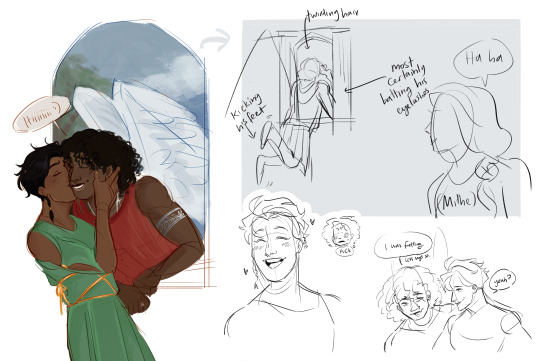

some old @chrysanthemumgames hermes-seph sketches!!! some of it is established-relationship daydreaming but also a peek at my dark and twisted mind (sprawling intricate spidey au)
#colored that top left one for my sidebar. lol.#a/tsv release made me so sick about spider-man you had to be there. im still on my bullshit but its a little more maintained#mostly bc a/tsv actually came out and i was attacked by every terrible take ever. some of u should not consume media#i know its rich coming from the IF player who enjoys romance but not everything is about romance or self insertion or ocs#miguel tag was UNUSABLE. IM TRYING TO BLOG ABOUT HIS HYPOCRISY AND SEE FANART. NOT SEE FANFICTION!!!!!!#also coming out as the biggest raimispidey2 mj speech enjoyer. im sorry. raimi trilogy is a bit messy to me BUT#if u take the mj speech at the end of 2 then it is. SO SO SO CUTE TO ME. (ignore the context its in pls)#also how her first comic appearance was IN HIS DOORWAY TOO!!!!#of course it was quite easy to project that onto sephmes from my brain so. here we are#talking mostly about raimipetermj rn. but hermes is simply not a Nerd like maguire's pete. so some insp from 616#but comics p/etermj is its own can of worms. i am taking bits and pieces of spideymedia i like and making my own sandcastle ok#sorry for spidey meta in the foa post i will shut up nyeow#fields of asphodel#foa#hermes#seph#and also i think hermes would make a crazy mj (the association with red and how intensely similar they are with how they present themselves#but the fact is . i really really love drop dead gorgeous seph who is wanted by everyone. its true. im one of them#<- i say this like the s in seph doesn't stand for s/pider-man. i have plenty of spideyseph doodles in the archive
84 notes
·
View notes
Note
I think fans want Jason to be a good person or be becoming one. To have a character that is well meaning and compassionate but decided murder is ok and to stand against main heroes who’s beliefs and actions go against the people he cares about and wants in his life. It’s confusing for people. People want their fav characters to be happy. But Jason can’t have his family’s support and follow his moral code. He’s cares about people and Gotham, and he’s an asshole who kills. It’s messy. It’s not black and white. I don’t even think Jason cares about being a good person or in the right anymore. I think he cares about what will save the most people instead.
Oh my goodness gracious I’ve been bamboozled
Batman’s definition of Good is not synonymous with absolute good/right no matter how much dc insists it is. Torture, battery/assault, surveillance, those are all condemnable actions too. I won’t get into the exhausting and frankly dumb debate of comic book morality wrt killing because I’ve already reblogged plenty of posts from other people who explained my thoughts on the matter far better than I ever have the patience to sit down and articulate. I also just think the notion that there’s something to be done about fictional characters who kill nazis and senseless murderers is stupid. Jason’s point is that the “main” heroes’ sanitized definition of right has its unaddressed holes and flaws which ultimately result in more preventable fatalities, and that he’ll work to correct those missing spots.
He doesn’t not care about doing what’s right. What he doesn’t care about (at least during his Winick characterization) is whether Batman thinks he’s right or wrong, because he sees the flaws in Batman’s methodology (and since he has a mind of his own). Batman’s methods alone cannot address Arkham’s revolving door and the rogues that come and go through those doors who have no intention (or capability from the doylist pov) of ever changing or undergoing redemption. Jason knows that he’s minimizing the number of preventable deaths by killing his targets, typically Characters Who Simply Do Fucked Up Shit Just Because, Why The Fuck Not?
Secondly, Jason is compassionate … to a fault. That was his fatal flaw. If he wasn’t so hell-bent on saving his potential birth mother he just met from that bomb despite everything she did to him prior, he could have protected himself instead, however slim his odds of survival were. What about his relationship with his other parents? He was a caregiver during his early childhood years for Catherine, until her death. Even mature adults who are financially stable find being a caregiver to a dying parent to be extremely burdensome on their bodies and minds, but he never complained about it or resented Catherine for being unable to care for him. Despite how none of his parents have really been what he needed them to be, he doesn’t blame them for their failings, and even continues to think highly of them (Bruce included).
And post-death? Enter Lost Days. Despite being dead set on plotting his revenge on Bruce, he constantly sidelines this in order to save other victims who are helpless like he once was. His own anger, trauma, and mission don’t remain his priority. (Sound familiar? Something something my own trauma above my son’s, mission above all else, etc.). Why would he waste precious time and risk his own life to do this if he wasn’t empathetic towards these victims or didn’t care about doing the right thing. He is simultaneously horribly traumatized and full of rage, and also incapable of ignoring what’s happening to victims around him (even as he claims that it’s indeed not his priority). And in that same vein, the entire premise of his rebirth outlaws run was that he doesn’t care if the public views him as a villain, an outlaw, so long as he can protect Gotham. And anyway where is this portrayal of him not caring about being in the right anymore. Almost every modern Jason story is about him grappling with where he stands with Bruce/Batman. During the early 2000s was probably the last time he did not care (hello, tentatodd??).
Jason has very evidently been portrayed as a kind and compassionate character. He is also simultaneously a calculated killer who doesn’t hesitate to kill when he deems necessary, and does so without remorse. It’s called being a Complex Character With An Edge™ that as you said, people so often claim to love. However when he fulfills that latter part, that seems to upset people because “killing bad”, and they then try to shave off and round out all his edges and claim he shouldn’t be that angry. In that case I guess you should just stick to liking traditional one-dimensional characters instead of claiming to like Jason but then encouraging his character assassination attempt by dc. Lol.
Lastly, who said anything about the batfam making Jason happy? Just because he’s written nowadays to want acceptance from Bruce (a shoddy attempt at forcing a non-existent nuclear batfamily), doesn’t mean that it’s a sound decision or that it does his character justice. I certainly don’t empathize with the idea that Jason needs the family’s approval or acceptance to be happy. (And anyway he has enough outlets for angst and pain aside from the batfam hello explore his other sources of trauma and do more deep dives into how he thinks when he’s alone). I don’t want them to magically make up and become one big happy family. This is not disney Lol. Besides, there are plenty of stories from dc that have that type of “wholesome” (hate that word utilization) characterization for Jason (Li’l Gotham, Tiny Titans, wfa, and even new stuff like the brave and the bold mini) and that is sufficient imo. Jason fans who are invested in the character deserve accurate, nuanced characterization and well-written stories, whether they be from his robin days (e.g., Batman: The Cult) or as red hood.
#fellas. ya know what else is wholesome? avenging your own death#you can have moments of ‘reconciliation’ or peace but still maintain a strained relationship which is far more realistic#‘he’s an asshole that kills’ and Bruce is an asshole who doesn’t kill. lol.#you can’t claim Jason’s conflicted and disturbed but go on to say Bruce is perfectly sane those two are mutually exclusive#also please realize that a character acting out of anger does not mean they lack compassion.#implying that he doesn’t care about doing the right thing is saying the same thing that person said;#that he doesn’t actually know what he’s doing. that he hasn’t thought through his moral stance.#‘Jason didn’t put any thought into anything he did in utrh he’s just a poor mentally ill lost soul who needs the batfam’s love to heal 💔’#🤝#‘jokers just a poor victim of society 😔 he just needs someone to understand him and maybe one day he’ll heal and realize he’s wrong’#what they both have in common is that they’re misunderstood in opposite directions#the joker doesn’t have a point to prove. there’s no deeper meaning behind what he does. everything is a joke to him.#he isn’t unaware of right vs wrong lmfao#jason todd#dc#asks#my post#and I think you’re implying that he’s utilitarian based on that last part but I don’t think he is#user mintacle posted a few metas regarding that and again they explain it much better than I prob could#anyway it isn’t difficult to understand his character if you know why you like him and you actually read his stories#that post specifically was from someone who clearly said they did not read the comic so. technically they’re on their own wavelength#edit: grammar
164 notes
·
View notes
Text
something something this scene from the trailer being a parallel to mary-ann and seymour (fated to end up alone in their despair and having to “act” a part)

add this to the fact that mary-ann’s last name was guillotin and furina gets, well…
#my ramblings#can you tell i'm excited about this patch. i'm actually posting about genshin for once#the whole quest in elynas was so fucked up#reading the notes the institute left behind during mary-ann's quest and then finding out what jakob did to him...#and how the institute created a monster to try and heal one of their own#my friends don't play genshin anymore (not that they even cared about lore to begin with) so i have no one to rant to. augh#anyways. furina my beloved girlfailure#genshin#genshin impact#genshin 4.2#genshin furina#genshin meta
62 notes
·
View notes
Text


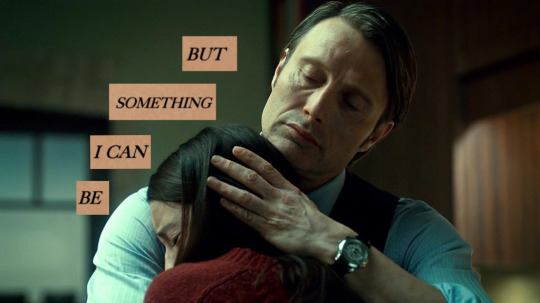


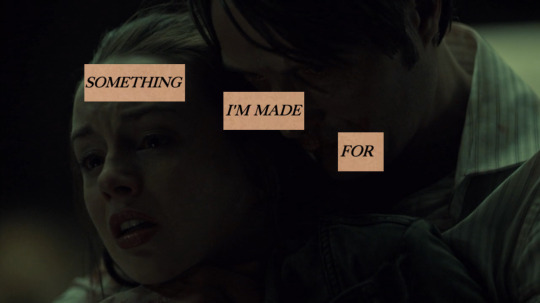
Long live Abigail Hobbs.
[Hannibal (2015)/What Was I Made For-Billie Eilish]
#this idea has been stuck in my head ALLLLLLLL DAYYYYYY#i know i posted about it earlier so heres an edit#literally all i can think about is how fucking taken advantage of she was#I think it’s a really common trope in fics to give her agency/make her a happy cannibal#but like. i think sometimes we forget that she was a child forced to do these things as a trade off for her own life#her sense of self became so warped that she couldn’t do anything to escape the pattern#she was always going to die in her fathers kitchen#hannibal#nbc hannibal#hannibal nbc#abigail hobbs#web weaving#hannibal meta
143 notes
·
View notes
Note
Don’t know if you made a post on this but what’s your opinion on DCAU Clark and how unapproachable(?) they made him in the later JL/JLU series without ever resolving it? Like I know the Cadmus arc hinges on him never considering himself a possible threat but it seems there was room for no much introspection outside a couple moments (that were later backtracked).
I've had like 6 half finished posts about this buried deep in the drafts for a year because I have capital B Brain Rot about this, but every time I tried to write it out I got six sentences in and wanted to rewatch the entire DCAU in order to get my facts straight. This time I'm resisting the urge, so forgive me if I forget specific episodes
Also, unfortunately for you, it’s nanowrimo, which means my brain is in Type All The Words Mode, and not Communicate Effectively and Succinctly Mode, and also I need a break from WSBF chapter 8, so. You’re getting a 3.5k essay sort of answering this question but not really. you will see
Thank you to my fellow lawyer for the defense of Rectangle Clark @januariat for helping to put this together
I do rewatch STAS and JL a fair amount, but much less JLU, so I actually don’t have much to say about the specific execution there. I’m planning on rewatching it soon. But for now…
To me it boils down to two answers. The Doylist answer, and what I think the writers really did have in mind, is that they came up with the Cadmus plot, knew it was an absolute banger of a storyline, and decided that it was worth compromising Superman's personality in order to write a good story. which is not something I can fault them for - as a fanfic writer, I make the same calculated tradeoffs every time I set out to write a fic. Characters are tools for narrative, even if these particular characters come with an additional weight of the tradition of collaborative storytelling that their most effective stories honor.
However, I do think it’s possible to, post-hoc, cobble together a Watsonian, narratively satisfying (if fucked up and sad) character arc for DCAU Clark if you also take STAS and JL into account. I think the key to understanding his character arc is his relationship with control. Throughout STAS, JL, and JLU, and then one more time in Batman Beyond for good measure, over and over again, he's manipulated and his powers and body are used as resources for other people. Obviously that’s not much of an excuse for becoming more authoritarian/overbearing/etc, Fascism Is Bad and I personally think a more IC superman would retreat more than double down (as in Kingdom Come), but looking at the totality of things that have happened to him before Cadmus, it's a little more understandable why he'd get close to snapping under the strain. Here's my personal reading of his arc, and the events that might have led to Clark behaving so irrationally in JLU.
cut for sheer length, but also mentions of manipulation, sexual assault, victim blaming, that sort of thing
One of the recurring themes in the DCAU is villains dehumanizing, depowering, and/or manipulating Clark. In STAS, Parasite, Lex via Bizarro, Talia and Ra’s al Ghul use him as a source for their own power. The Preserver and Maxima treat him like some exotic prize, disregarding his wishes. Jax-Ur and Mala use him and then betray him. But the most impactful, by far, is Darkseid.
In Apokolips Now, Darkseid defeats Clark, puts his bleeding body into public stocks, and drags him through the middle of Metropolis. Clark’s only rescued by the last minute intervention of the New Gods, and as a parting shot Darkseid murders Clark’s friend in front of everyone. Even though Clark prevents Earth from turning into Apokolips, it’s a huge emotional loss, and they don’t shy away from showing his rage and helplessness. But it’s when Darkseid returns in Legacy, the finale of STAS, that Clark’s life truly takes a turn for the worse.
Forgive me if this is all plot recap to you, anon, but I feel like a lot of people don’t know that STAS ends with Clark being mind controlled, heavily implied to be sexually assaulted, and forced to try to take over the Earth, killing god knows how many people in the process. When the military finally brings him down with a Kryptonite warhead and imprisons him, they nearly kill Supergirl in the process. Then Lex almost gives him a lethal injection, with a US general looking on, implying that the government approves of killing him. Lois breaks him out, he tries to get help for Kara from Dr. Hamilton, and then goes to Apokolips. Most fights in STAS have him shrug off blows. He ends this one bleeding from his mouth, looking almost dead. When he finally casts down Darkseid, tells the Hunger Dogs (the slaves on Apokolips) that they’re free… they turn away from Superman. They cluster around Darkseid to protect and heal him.
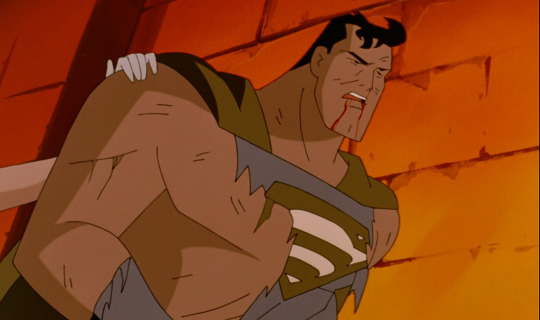
Those universal truths of a lot of Superman stories, that goodness and liberty and the American Way* always win? They don't in STAS. A representative of the US government (as far as he knows) has tried to kill him. He lost his temper and spoke in a harsh tone of voice once, because Kara was dying and he was hurt and desperate, and now his friend Dr. Hamilton, the man he trusted to repair the Kryptonian ship, study his body and his powers, one of the people who knew him best in STAS, is afraid of him - and, as we find out later, takes immediate, drastic, and violating action against Kara and against him. The series ends with the small town man standing on the roof of the Planet, hearing people hate and fear him, wondering how people will ever trust him again.
*I hate this phrase personally when used as a Superman Motto, but it's used here as a contrast to the fascistic imagery of Apokolips Now and Legacy (as well as Brave New World, which, hoo boy, we aren’t even getting into that one).
Six months (iirc) after the STAS finale, in Secret Origins, the US government has agreed to let a visibly older and wearier Superman help disarm the nuclear stockpile - only for this to backfire on him because it was a Plot by the White Martians. Clark’s let down the country again. He’s helped aliens invade again, and to make matters worse, he sped away in the middle of an attack to break into an official government facility to free J'onn. Clark founds the Justice League beginning from a place of personal failure, as a check on himself. Clark has power and wants to help people with it, but he’s been turned against people he cares about, and has twice now failed to protect the world. It’s worth noting that Legacy put him into the world stage; before, in STAS, I can’t think of any true worldwide threats besides maybe Jax-Ur and Mala.
Most of the rest of season 1 of JL isn’t particularly Clark-focused, although he does appear in a lot of episodes, but the themes of some of these episodes are potentially relevant to understanding his character later, so: brief bullet point summaries.
During In Blackest Night, Clark sees his respected colleague turn himself into an authority that turns out to be incompetent investigators looking for a scapegoat. Interesting. Surrendering to governmental authority/oversight didn’t turn out too well here.
During The Enemy Below, on Clark’s advice, Aquaman tries to solve his problems peacefully with diplomacy and is immediately shot in a life threatening assassination attempt. Peaceful diplomacy doesn't work so well for him.
During Injustice for All, Lex is dying of cancer. Clark tries to reach out and is rebuffed, with Lex going on to try to found a team to kill him and the rest of the League.
During Paradise Lost, Clark sees his respected colleague turn herself into the authorities and immediately get banished from her home for the crime of trying to save it with all the resources she had at her disposal. Interesting. Surrendering to governmental authority/oversight didn’t turn out too well here, again.
During War World, Clark’s again captured for exploitation. This is essentially a retread of The Main Man from STAS, doubling down on how some people see him as a thing to be exploited.
During Fury, Clark’s completely ineffective at preventing an attempted genocide of half the world’s population.
Season 2 opens with Twilight, one of the most important episodes for understanding Clark’s mindset during the Cadmus arc. Imagine, if you will, the above happening to you. Darkseid shows up at your workplace. And the man you’ve worked with the longest, your friend, your ally, tells you to cry him a river, build him a bridge, and get over it. Tells you to get over being brainwashed, manipulated, and humiliated. Tells you to get over having your broken and bleeding body paraded around the streets of Metropolis, tells you to get over having your friend killed in front of you for trying to defend you, tells you to get over almost getting your cousin killed. Sure, Brainiac is a planetary-scale threat; Darkseid and Apokolips are in real trouble. Clark was wrong to write off Apokolips and its people, and the League should absolutely have intervened in the situation. But the way Bruce went about it was… one of the harshest things DCAU Bruce has ever done, and one of the only times the narrative seems to actually agree that he was an asshole about it. And even then, you really need the context of STAS to understand why Clark is so furious and hurt in this scene.
Clark relents and goes along with Bruce’s plan to trust Darkseid, only to end up betrayed again, the whole ruse just another ploy for Brainiac to gain control of Clark, torture him, and use Clark’s body to upgrade himself. Clark had spared Darkseid back on Apokolips at the end of Legacy, on Kara’s advice. But now Darkseid’s come after him, again. Used him again to put not only Earth but who knows how many other worlds at risk, now that Brainiac’s even more powerful. It’s the downfall of Krypton, over and over again. And when Clark goes to end it, I think he doesn’t care that the base is about to go, as long as Darkseid goes down with it. That isn’t a price Bruce is willing to pay, so he teleports Clark out. And he’s wrong, again. “No one could have survived that.” Well… no, Bruce. Darkseid does, and Clark knows it.
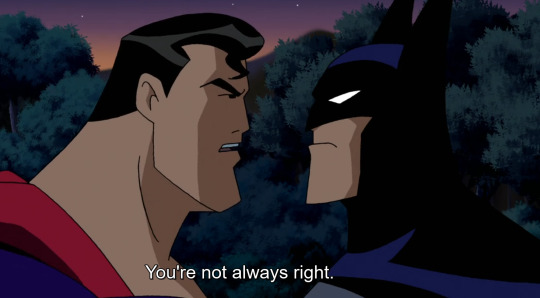
During Tabula Rasa, Lex manipulates Amazo the exact way he tried to use Bizarro. Clark once again fails to guard against a terrible, potentially world-ending threat, and in fact makes the situation worse by his very presence.
Then we come to Only a Dream, another key episode in understanding this version of Superman. Clark’s deepest fear is that his powers will keep on growing beyond his ability to control them, eventually destroying everything around him. In his nightmare He kills Lois and Jimmy, destroys the Daily Planet, and grows into a brutish, hulking, clumsy figure, first crying out for someone to help him, and then losing hope. He doesn’t want to hurt anyone. He goes back to the Kent farm and curls up in the spaceship in the fetal position, convinced that he’s only going to hurt anyone who tries to help. Is it any wonder, since that’s literally what’s happened to him in Legacy? Is it any wonder that he’d want to give up, to retreat? If we’re to take the World of Cardboard speech literally, he’s already having to focus on this restraint every day, in every interaction. This is my personal explanation/hc as to why in every single fight he lets himself get knocked around a bit first; he’s calibrating how hard he can hit back without doing irrevocable damage. Anyway. Deeply fucked up 2 minutes of horror. Wish they’d explored this a little bit more in later seasons.
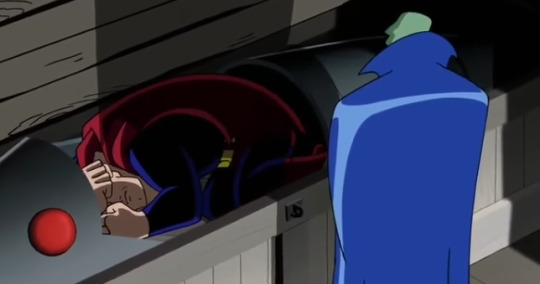
Then, directly after this, it’s A Better World. After we’ve just seen that his worst nightmare is hurting people by being unable to control his powers, we come face to face with a world where he’s hurt people by the precise and controlled application of his powers. Justice Lord Clark uses the same Superman Robots we saw Kara use in Legacy. He’s become quite adept at his lobotomization techniques. Later on in JLU, we see ‘our’ universe’s Clark attempt to lobotomize Doomsday the exact same way Justice Lord Superman did. Again, Clark fails to protect the world from himself, and to make matters worse, the guy to save the day is Lex Luthor. I’d be a little miffed if the maniac who wants to kill me so so bad turned out to be instrumental in saving the world and now I owe him some unspecified favor in the future. Clark’s met with failure and distrust trying to fix things his way, now he tries to do things in an uncharacteristically sneaky way and… gets met with more dislike and distrust.
Eclipsed continues this trend of hurting his friends; he’s temporarily mind controlled and hurts Wally.
In The Terror Beyond, he fucks up and puts the world in danger again, all because from his point of view, he tried to prevent Solomon Grundy being manipulated and used (like he himself has been used over and over again).
In Secret Society, his frustration comes to a peak, amplified by Grodd’s telepathic manipulation. He’s been trying to do his best, but he snaps that he’s had better luck fighting armies alone (dubious plural there, but he did pretty much evaporate an army in Legacy, so at least once, ok) and that he’s had to hold back his abilities in order to be on the League. Again if we take the World of Cardboard speech at face value, this is true, and we see it in the episode when he accidentally hurts Shayera with heat vision despite shouting a warning beforehand. It’s also telling how other members of the League have the ability to constantly voice doubts about its usefulness and cohesiveness as an organization (hi Bruce) but when he expresses the same doubts everyone gasps. When he expresses his doubt and frustration, when he steps away, the organization that’s collectively saved the world several times falls apart; they’re reliant on him, and he has to be aware of the entire existence of the League as an extra burden of responsibility.
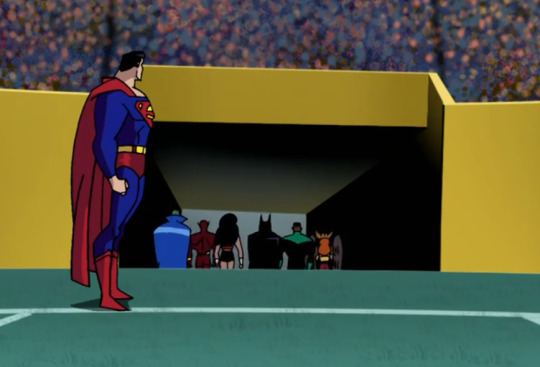
Since both this episode and the Cadmus arc as a whole are meant to show his flaws as a leader, it’s worth examining the foundations of that leadership as established in the DCAU. Clark’s the leader of the League, but narratively, Bruce is its brains and its ethics and Wally is its heart. As a result, Clark is filling the role of leader of the League without the narrative scaffolding that gives him the respect comics incarnations of the character are generally accorded. (I’m admittedly only drawing here from the JLA runs I’ve personally read, Morrison/Porter 90’s JLA and the early Fox/Sekowsky 60’s JLA). Superman might not technically be the First Superhero according to these continuities, but he is respected as though he is (and as we comic book nerds know him to be). The League in these comics treat him as something of an ethical standard bearer, a primus inter pares, as well as being the muscle. In the DCAU, Batman, having founded the DCAU with BTAS, is the First Superhero, and the entire plotline of the Justice Lords centers Wally as the emotional anchor of the team. Clark doesn’t have that pre-established stature. What really qualifies him to be the leader, besides the fact that Bruce doesn’t want to do it? His position seems precarious, relying more on Superman’s pre-established reputation than his actual onscreen characterization. Centering Bruce and Wally are legitimate creative choices I don’t even necessarily disagree with, but it means Clark-as-leader functions quite differently than more traditional JL structures.
Hereafter is something of a healing point for him. It’s a little fucked up that Superman almost bashes Vandal Savage’s head in with a rock, but you take what you can get at this point. He comes out of it fine, but everyone else is forced to reckon with what he means to them. Hereafter coming directly after Secret Society is a very good reunification for the League. Shame about what’s gonna happen in three episodes.
In Wild Cards, he’s useful to address the immediate threat but ineffective to stop the real, countrywide (worldwide?) threat. (I should note that of course I don’t expect every episode’s threat to be solved by Clark; I’m just pointing out a trend that I think his character would perceive as failures on his part. If the writers ever let him reflect.)
JL ends as it began, with another massive alien invasion that Clark helped facilitate in Starcrossed, by working with the Thanagarians during the first part of their plan. As a fellow exile, a fellow alien, he’s hurt and angry with Shayera’s betrayal… even though, in the end, in probably one of his best moments, he votes to allow her to stay in the League.
(Sidenote: almost every interaction Clark has had with other aliens have been despotic societies or individuals: Jax-Ur and Mala, Apokolips, Maxima’s planet, War World, and now Thanagar. The Guardians built robotic police/foot soldiers to enforce their will. Even New Genesis is ruled by a benevolent dictator. Martian society is nearly extinct, overrun by… more alien despots, surviving only with J'onn. Argoan society is nearly extinct, surviving only with Kara. At least Lobo isn’t a fascist? Small consolation.)
JLU begins after a short time skip. I’m not as familiar with JLU episodes since it’s been a while since I’ve watched them, so I’m not going to attempt an episode-by-episode breakdown. Also this post is already way too long. But the point of this post is to look at Clark’s overall arc until this point, and see how it informs his decisions in JLU. For a more JLU-specific informed point of view check this post by januariat!
What we have is a man who naturally wants to take responsibility on his own shoulders, a doer and a fixer who wants to get into the ring and solve problems, who wants to use his abilities to help, being confronted over and over again with a string of personal failures, manipulation, and betrayal. When he tries to set a boundary about not being willing to help the man who took over his body and forced him against his home in Twilight, he’s told to get over it by his most trusted ally. When his deepest fears are revealed in Only a Dream, we see them having been already realized in Legacy. And when he’s presented with his dream of a peaceful life farming, a family that loves him, and no responsibility to save the world, it’s ripped away from him in For The Man Who Has Everything.
Ultimately, I don’t have a good answer for exactly how he doubles down in JLU S2, because I need to rewatch all of it with this understanding of the character. But I think you can see the shape of a traditional Superman character in there, trying and trying again and again to do the right thing, putting himself on the line - only instead of learning from his experiences and letting them inform his actions, he’s carrying the weight of years of suppressed trauma while trying to hold up the entire Justice League. This long, long run of failure, manipulation, betrayal, and distrust adds up. And there’s only so much weight one person can hold on their shoulders, even if they are a Superman.
(And then as the nice little capstone to his story, in Batman Beyond's The Call, he’s kept under alien mind control for years! With the way Starro clings to his chest, he probably hasn’t been touched in years! Trapped in his own mind, forced to watch as yet another alien species uses him as a tool to hurt his own teammates and invade the Earth! And that’s the last we see of DCAU Clark! What a fun little ending to his character arc that doesn’t make me go insane whenever I think about it. Very very very normal about this.)
#id in alt text#like i said. brainrot. i'm so normal about clark kent#you really do have to like. put this arc together in your own head though. they did NOT put this on screen.#long post#dc meta#DCAU#STAS#JL/JLU#clark kent#my fucking kingdom for a fic where j'onn helps him develop mental shielding against mind control. and also gets him therapy. one day#my writing#<fuck it. putting it in the writing tag so i can find it again#thanks for the ask :^)
57 notes
·
View notes
Text
Ok. Watched dungeon meshi recently .... and why did noone tell me Falin is also autistic??
Like. Yes yes, all the mob vs laios autism polls are fun, but mob is so much more similar to Falin than Laios - not just in how their autism manifests, or their personality, but like..... they're even both extremely powerful in their magical fields!! They both see and communicate with ghosts!!! They both ride the line between human and monstrous!!!! I love them so much...
But. If we're talking comparisons, between Mob and Laios...
I really think they're two sides of a coin. None is better than the other, they do vastly different things and are great in their own rights because of it.
Laios is an adult with autism who is surrounded by people who are annoyed by his presence or generally find him strange or offputting. He highlights the struggle of that, how hard it can be to find and keep true friends that actually care about you and aren't lying about just tolerating you when you're neurodivergent - and how even when you have great knowledge or skill in something, just as often it helps you, it will also make people look at you weird. He's loud. He's unapologetic. He's passionate!!! And the right people will come to appreciate that. But it doesn't erase the struggle that being so open often comes with.
Mob's narrative, on the other hand, is a coming of age story. It's about a traumatized autistic kid who isn't open, isn't loud, who makes an effort to not stand out - because he got burnt in the past, and he himself burnt others in the past, as a result of how his autism manifests. And it's about how he comes to realize that coming out of that shell is worth it. That there will be kind people waiting on the other side, that you're not doing anyone any good by ignoring your own wants and needs. That you have good to offer to the world!! That there's good people to meet !!! That you have more strength in yourself than you think !!!! And how even at your most destructive, all your flaws and true colors revealed, mask finally off .... your friends will still love you. Because you were always yourself. Even when you were hiding.
They do different things.
Dungeon meshi is a more realistic story - there's no otherwordly psychic powers amplifying the autistic symptoms present. It's just a weird, wonderful autistic man with his encyclopedia of knowledge and his small gaggle of friends. And the autism may not be absolutely central .. but it's there. Following the story every step of the way, influencing it that way or the other.
Mob Psycho 100 on the other hand is a lot more fantastical, and a lot more idealistic. There's no heavy worldbuilding to dive into, and the monsters and antagonists they face aren't the main course - instead, the main focus is on Mob, and his inner world, and gradually revealing more of it. In that way - while DM is an 'outside looking in' kinda story, mp100 is an 'inside looking out' one.
And I love both of them.
(Keep in mind I haven't read the dungeon meshi manga yet, just watched the anime ;^^ so I'm sorry that there's probably a lot more to add to the comparison on that front. Please don't spoil in the notes tho!!)
#this is just a rant that i had to get out lol#me upon watching any media ever: hmmm how can i connect this to mp100.... sorry lol#dungeon meshi#mob psycho 100#mp100#meta#autism#ramble#laios touden#kageyama shigeo#my own post
43 notes
·
View notes
Text
I've been an Invader Zim fan since 2011.
I was 15-16 at that time, and though I did thoroughly enjoy the show, I was not mature enough to really get it. Sure, it was funny, but I didn't pick up on the subtleties and style of humor beyond the surface level. I liked the wackiness and the characters, but I SURELY wasn't at a point of being able to deconstruct themes or analyze character motivations and narratives (like I very much enjoy doing now). I remember discovering an artist on DeviantArt who drew cute ZaGr stuff, so that was the pairing I liked too. I didn't think too deeply about much, and honestly, I don't think the majority of fans (if they were my age or younger, that is) did either. Everything was taken as dumb and silly for the most part, and that IS truthfully a major component of the show itself.
Getting back into Invader Zim within this past year though, I'm looking at it through a WILDLY different lens. I like Invader Zim for what it is and how it's intended to be perceived. I like that the show is meant to be dark, satirical, and tragic at the same time that it's silly, chaotic, and nonsensical. Almost everything that happens onscreen is written in to be funny above all else. (I've mentioned before that I've been watching Jhonen's Twitch streams for a while now, and I have a MUCH better understanding of his sense of humor bc of that. IZ makes way more sense if you can sorta see things from JV's perspective, lol.)
But at the same time, I also like Invader Zim for what it offers in terms of interpretation and what it can imply (intentionally or not). There is genuinely SO MUCH DEPTH to this dorky lil cartoon that a casual viewer wouldn't immediately pick up on. And a lot of that depth, I think, was not woven in purposely. The show itself was never meant to be taken so seriously. Nevertheless, I'm constantly fascinated by what IZ implies about good and evil, the nature of general society, and especially how it goes about demonstrating the devastating effects of social isolation and bullying. Meta for this series is always pretty damn *chef's kiss.* And what's even more interesting is how viewers manipulate canon to expand upon this world and these characters.
Given that I've come to understand Invader Zim better, I've also grown very fond of ZaDr. Now, while I wouldn't want to see this pairing happen in canon material, I love the potential it possesses in transformative contexts.
In reality, I get that these characters were intended to have a deep hatred for one another and a never-ending rivalry for the sake of comedy and not much else. It's an extraterrestrial perpetually throwing hands with a 12 year old because he's incompetent and his plans often fail. And that's funny. That's the point. But beyond that, canonically, these are two characters who are mirrors of each other; they're both treated like garbage by their respective peers, and they both crave acknowledgment, validation, and a sense of purpose. Throughout their story, they find they're only able to obtain these things from each other, so as a consequence of their similar personalities, they become utterly, unhingedly obsessed with each other (to a sometimes unhealthy degree). They are undeniably forever intertwined by design of how the show is set up.
And because of that, shipping of these characters was, frankly, inevitable in fandom spaces. I myself fell victim to their appeal too. (Sorry, Jhonen. 😅)
I'm not gonna go into any discourse surrounding this pairing because there's already PLENTY of that to go around online. Everyone has their own opinion on the subject, and that's fine. I respect that. Point is, even though I understand and appreciate what Zim and Dib are supposed to be in the context of the show, I also enjoy the idea of them as friends and romantic partners outside of and beyond the confines of canon.
And that's something that I think many fans who are biased toward ZaDr would also agree with! Actually, I'd say the majority of people who ship characters in ANY media would concur. We like the idea of seeing how specific relationships could develop over time and/or within different settings and circumstances. It's NOT always about wanting to see a relationship unfold on screen or in fan works strictly adhering to canon. It's about stretching canon, or in some cases, scratching canon entirely however you see fit! Who cares! It's fiction!
For me personally, I enjoy ZaDr because its attributes fall into so many trope categories that I've come to adore over the years (ones that I either wasn't aware of when I was younger, or that I didn't enjoy in the same intensity as I do now). Zim and Dib are, or could be, depending on context:
Codependent toxic soulmates
Human/non-human
Shared history
Classic enemies to lovers (or, as I often prefer it, enemies to friends to lovers)
Bicker couple
Battle couple, when put in the right setting for it
Violence as a love language
Smol and tol
The wild card paired with the rational one, the best part about this being that sometimes the more rational one is Dib, and sometimes it's Zim bc they're both a special flavor of insane
Make each other worse/stupider when together, tho oddly, they also kinda bring out the best in each other too
And, my personal favorites, the potential for hurt/comfort and angst with a happy ending, with the comfort and happiness aspects ultimately coming from each other
I like what these characters could be, to and for each other, apart from their roles in the show.
I would never want to explore a dynamic between Zim and Dib that goes beyond "frenemies" territory in canon (because that doesn't fit what the show is, and I do appreciate the integrity of Jhonen's vision). The subtle foundation for them is there, it's just that it can't really work unless a few key details are changed or manipulated, and, well...
I sure as hell like exploring every bit of that expanded potential in fan works because it's fun to imagine the various directions things could go if they were different!
This isn't me, like... trying to defend my (or anyone else's) enjoyment of this particular ship or trying to convince people to like it. Or the show for that matter! To each their own, truly. And I'm obv aware of the controversy ZaDr often incites and why. Everyone has valid reasons for liking OR not liking it, and I accept differing viewpoints on it. It's a touchy, nuanced subject to be sure. But this isn't about that.
I don't really know what this is, actually, aside from a very long very weird essay, lol. I just wanted to process why and how all of this works for me with my changed perspective from when I was first introduced to Invader Zim in my teens up until now.
It's strange, looking back. I didn't get ZaDr years ago. But I do now, and so much of it, at least from my perspective, has to do with taking the crumbs present in canon (that are undeniably there, whether you choose to acknowledge them or not, and whether they're intentional or not) and absolutely running with them to the ends of your own wild imagination.
#invader zim#invader zim meta#zadr#iz zadr#zim#dib membrane#my posts#this is... A LOT but i just needed to work thru it for my own sanity lol#said it before and i'll say it again: pls utilize the tag blocking function however you need to bc i KNOW this can be very Yikes for some#but at the same time this is my blog and i'm gonna do what i want :P
22 notes
·
View notes
Text
Cancelled She-ra (2018) Action Dolls
In 2019 Mattel released eight fashion dolls for the 2018 She-ra reboot featuring Adora, Glimmer, Bow, Catra, Shadow Weaver, and 3 versions of She-ra (there was also a Swift Wind model). However, the line was planned to be more extensive before being cancelled (and we all know how disastrous the rollout of the completed line was). Prototypes were made of Mermista, Queen Angella, season four Glimmer, and Entrapta, though no photos of the latter have emerged.
All photos come courtesy of the Instagram of (at the time) Mattel employee and packaging designer Darren Sander (who also worked on the mainline She-ra designs), but Dollect did us all the courtesy of pulling the photos since it's a pain to do with Instagram. Some of these photos feature unfinished doll parts that might be a bit disconcerting.
Mermista:

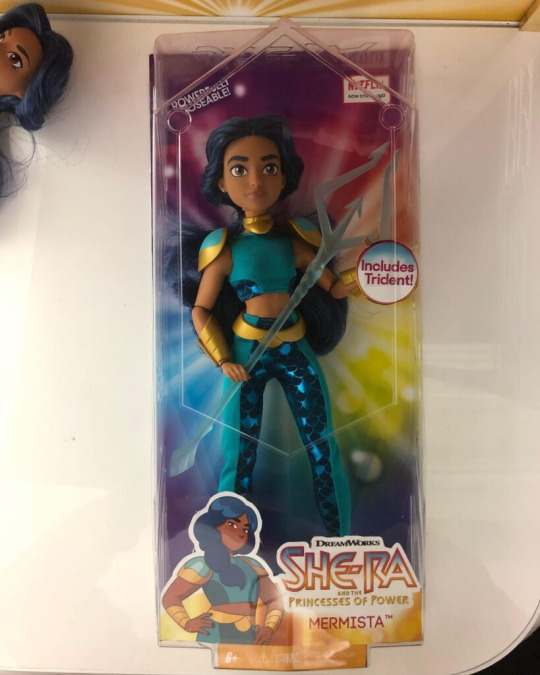

Designed by someone named Annalise (no last name given, but probably this Annalise since she did the core line), Mermista was probably planned for a second wave of toys that never came to be. This is her prototype. It's unknown how "finalized" she was or if there would have been more passes on her design.
Queen Angella & Queen Glimmer 2-pack:

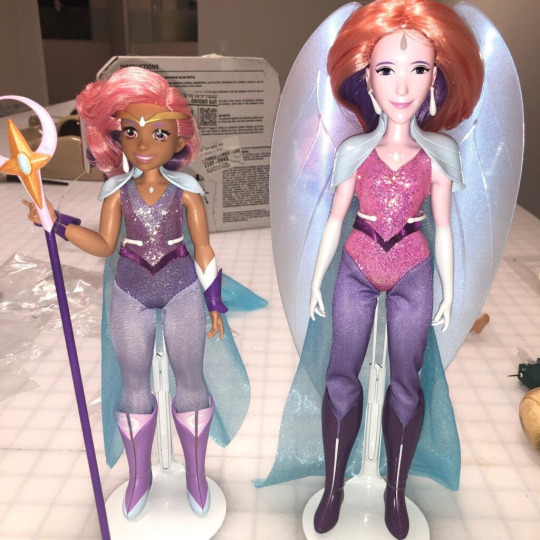




First two photos are earlier prototypes on immovable dolls, the more unfinished photos feature the "powerfully poseable" bodies and sculpt.
Angella's forehead gem was going to be a separate inset piece (as shown in the head sculpt in the 4th photo). Her wings were going to have an aurora borealis effect on them and both outfits were covered in glitter. Darren Sander seems to have done more work for these two.
Alas, Entrapta's prototype was never shared, but suffice to say, we were robbed.
#she ra#spop#spop meta#merch#words and things#im REMAKING THE POST since it was suppressed/missing??? on my own dash??? idk if that was true for everyone but im trying again#if it keeps happening then idk man i dont know why that's happening#OKAY IT WORKED. HI. LOOK AT WHAT MATTEL TOOK FROM US#i dont really like angella but fucking MERMISTA??#mattel can catch these hands im done playing#doing dives into their instagram accounts i found more info on details of the dolls and now i might have to make a separate post about them#my hell is unending
74 notes
·
View notes